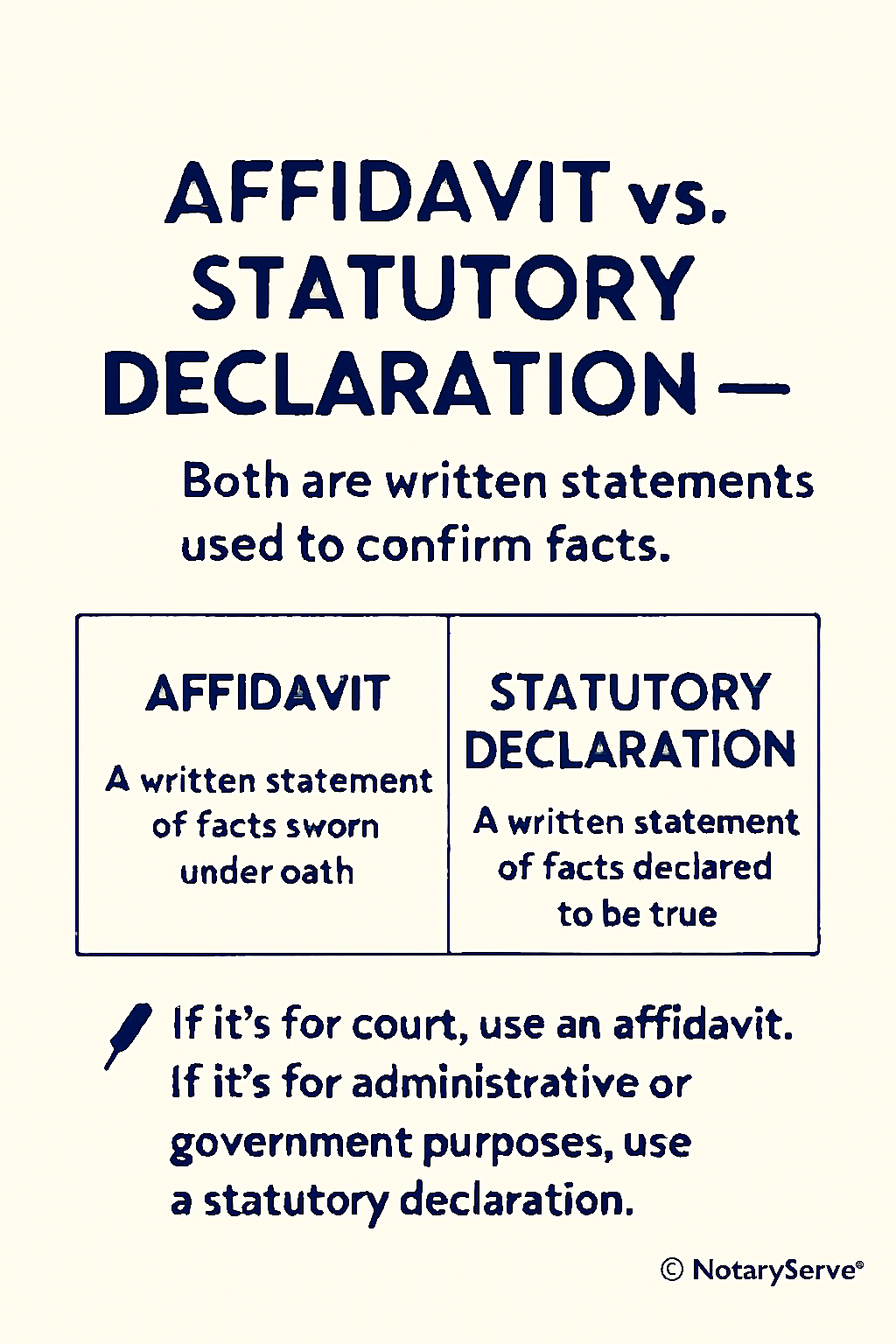Both affidavits and statutory declarations are written statements made under oath or affirmation to confirm facts. They often look similar and serve similar purposes, but in law, they are not the same. Understanding the difference between an affidavit and a statutory declaration is important — especially when preparing legal documents, applying for government programs, or submitting evidence in court.
NotaryServe provides professional notary services for affidavits and statutory declarations, ensuring your documents are properly drafted, witnessed, and legally valid. Contact NotaryServe at (613) 558-5363 or contact@notaryserve.ca for assistance.
What Is an Affidavit?
An affidavit is a written statement of facts that a person swears or affirms to be true before someone authorized to administer oaths, such as a commissioner for taking affidavits (a notary public or a lawyer).
Affidavits are used primarily in legal and court-related matters, for example:
- Supporting evidence in a civil or family court case
- Confirming service of legal documents
- Swearing financial statements or other filings required by the courts
In Ontario, affidavits are governed by the Commissioners for Taking Affidavits Act, R.S.O. 1990, c. C.17. When you sign an affidavit, you make a formal oath or affirmation that the contents are true. Lying in an affidavit can amount to perjury, which is a criminal offence.
Key Features of an Affidavit
- Must be sworn or affirmed before a commissioner for taking affidavits (such as a notary or lawyer)
- Commonly used in court or litigation settings
- Involves an oath (religious) or affirmation (non-religious)
- False statements may lead to criminal penalties for perjury
What Is a Statutory Declaration?
A statutory declaration is also a written statement of facts confirmed to be true, but it is not sworn under oath. Instead, it is declared to be true under the laws of Canada or Ontario.
Statutory declarations are typically used when no legal proceeding is involved, but proof of a fact is still required. They are governed by the Canada Evidence Act (for federal matters) and the Evidence Act, R.S.O. 1990, c. E.23 (for provincial matters).
Typical examples include:
- Declaring identity, marital status, or residency
- Confirming loss of documents (e.g., passport, driver’s licence)
- Statements required by government agencies, universities, or employers
- Business or immigration applications
Like an affidavit, a statutory declaration must be signed before a commissioner for taking affidavits (such as a notary public or lawyer).
Key Features of a Statutory Declaration
- Not sworn under oath; instead, the declarant “solemnly declares” the statement to be true
- Commonly used for administrative or non-court purposes
- Governed by the Evidence Act (Ontario) or Canada Evidence Act (federal)
- False declarations may result in charges under the Criminal Code for making a false statutory declaration
Summary of Differences
| Feature | Affidavit | Statutory Declaration |
|---|---|---|
| Legal Basis | Commissioners for Taking Affidavits Act | Evidence Act (Ontario) or Canada Evidence Act |
| Oath or Affirmation | Yes | No oath – a formal declaration instead |
| Typical Use | Court or litigation documents | Administrative or non-court matters |
| Who Can Sign It | Commissioner, notary, or lawyer | Commissioner, notary, or lawyer |
| False Statement Consequence | Perjury (Criminal Code) | False declaration (Criminal Code) |
Which One Should You Use?
If your statement is being filed in court, you will almost always need an affidavit.
If your statement is required by a government agency, business, or non-judicial process, you will usually provide a statutory declaration.
When in doubt, check the institution’s requirements for the document or consult a lawyer or notary to ensure you use the correct form.
Why Choose NotaryServe®
At NotaryServe®, our notarization process is stress-free and efficient. Our experienced team ensures your statutory declaration or affidavit is prepared correctly, notarized properly, and accepted wherever you need it.
For Your Appointment, Please Bring:
- Government-issued photo ID (for both partners, if applicable)
- The draft affidavit or statutory declaration (or we can help you create one)
- Any proof of shared residence or joint accounts (optional)
📍 Website: www.notaryserve.ca
📞 Phone: 613-558-5363
📧 Email: contact@notaryserve.ca
🗓️ Book Online: www.notaryserve.ca/contact
⚠️ Disclaimer
The information provided here is for general informational purposes only and does not constitute legal advice. Requirements for affidavits, notarization, and document use may vary by situation or change over time. Confirm requirements with the appropriate authority or seek professional legal advice before taking action.
